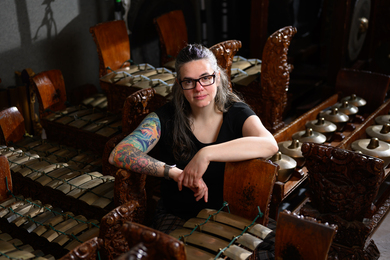A faculty committee chaired by Associate Provost Phillip L. Clay has issued a draft set of principles to help guide MIT in establishing policies for faculty involvement in outside educational activities and for ownership of intellectual property created for electronic distribution.
The dissemination of this draft report begins a period of intense discussion and review of this work. The timetable includes:
- Open comment period involving faculty: January-February.
- Discussion at faculty meeting, February 21.
- Discussions in Academic Council on potential changes in Policies and Procedures: March-April.
- Report to faculty at May faculty meeting.
The draft report of the Ad Hoc Faculty Committee and related documents can be found at http://web.mit.edu/committees/ip/. The MIT community is strongly encouraged to review the draft principles and send their comments to ipfeedback@mit.edu, Professor Clay said.
"Important new issues face MIT and other universities as higher education changes in the age of electronically available information," Provost Robert A. Brown said in a message to the faculty announcing the report.
"The creation of the Internet and of new means for distributing educational content have led to new opportunities for faculty members and universities to deliver education. These new opportunities also create potential conflicts between personal initiatives of a faculty member and their responsibilities to MIT. These issues differ from many of those we have worked with in the past because they involve creating intellectual property developed around educational content, as well as from research.
"It is important for our faculty to think about the impact of electronically available information, about the mission of the Institute and our core values, and to establish the set of principles that will help guide faculty governance in this rapidly changing arena," Provost Brown said.
The report results from the provost's charge to the committee to establish principles that will address the following areas:
Ownership of intellectual property -- Traditionally, MIT has exerted ownership of intellectual property created from research but done so only rarely in the arena of educational material. Ownership has been determined by and based on the use of MIT resources in the development of the intellectual property. What constitutes intellectual property in the arena of new educational technology, and how do our principles apply in deciding whether the intellectual property was developed using Institute resources?
Faculty commitment to MIT -- Implicit in faculty governance is an understanding of a faculty member's commitment to MIT. What constitutes a conflict of commitment in the new world of educational delivery?
Faculty dissemination of scholarly material -- A critical part of the academic enterprise is the control by the faculty of the dissemination of the products of their scholarly work. Any new principles must be consistent with this understanding. How has the new medium changed the dissemination the faculty's work?
Reporting of faculty outside professional activities -- The Institute has relied on faculty reporting of outside professional activities to monitor the potential for conflict of interest. Does our present reporting process satisfy this need to monitor the conflict of commitment?
The report offers 14 statements of principles with background explanations to clarify each recommendation, as follows:
- Statement of the core mission and values of MIT as it relates to these principles
- Statement respecting faculty research and scholarship and the right to unfettered dissemination
- Principle of a unitary Institute community
- Statement regarding education as a community enterprise
- Principle of faculty commitment
- Principle regarding notification and disclosure
- Definition of "Institute resources" and what makes a resource institutional
- Principle regarding use and protection of the MIT name
- Principle regarding revenue-sharing
- Principle regarding competition and faculty external activities
- Statement on dispute resolution
- Principle of advancing scholarship through collaboration and open dissemination
- Principle regarding MIT advocacy or faculty use of their intellectual property for educational purposes
- Principle dealing with students and educational technology
The Statement of Principles will also be published in the next issue of the Faculty Newsletter.
Last spring, Provost Brown formed the committee, chaired by Professor Clay. Members included Professors Hal Abelson and Randall Davis of electrical engineering and computer science; Peter S. Donaldson of literature; Steven R. Lerman of civil and environmental engineering, faculty chair and director of the Center for Educational Computing Initiatives; David Litster of physics, vice president and dean for research; Dava Newman of aeronautics and astronautics; Steven Pinker of brain and cognitive sciences; and Thomas M. Stoker of the Sloan School.
A version of this article appeared in MIT Tech Talk on January 31, 2001.





